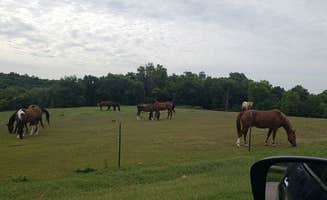Horseback trail riding enthusiasts will find several dedicated camping options within a 45-mile radius of Nebraska City. Nestled in the Loess Hills region of southwestern Iowa and southeastern Nebraska, these areas offer varied terrain from river valleys to forested ridges. Most equestrian campgrounds maintain separate facilities from standard camping areas, with many providing water access and specialized amenities for horses during spring through fall months.
What to do
Trail exploration: Indian Cave State Park offers approximately 20 miles of multi-use trails through oak woodlands. "There are about 20 miles to hike in this park and there is a special camping area for folks who bring horses. I was here in the spring but was told fall is the best time because of the changes in the trees," notes James D. from Hackberry Hollow Campground.
Scenic overlooks: Waubonsie State Park provides trails with elevation changes leading to impressive vistas. "We took one of the more scenic trails and took us over the top of some of those beautiful Loess Hills," shares Tony B., who adds that it's "only a hour away from Omaha for us."
Water activities: When not riding trails, many equestrian campers enjoy nearby water recreation. "There is a trail that's really steep but the view from the top of the river and the valley is worth it," explains G&R D. about Indian Cave's trail system that leads to Missouri River views.
What campers like
Diverse terrain: The varied landscape around Waubonsie offers different riding experiences. "The trails are beautiful and quiet, with several scenic overlooks. Bikes are not allowed on trails," mentions Jennifer M., highlighting why this makes for good horseback riding territory.
Fall foliage: Autumn is considered prime time for equestrian camping trips. "The view is great from the side bluff train. Close to Nebraska city. Tent sites are not too close together. Can get pretty busy on weekends in the summer," reports Emily M. from Waubonsie State Park Campground.
Trail difficulty options: Riders appreciate having choices based on their experience level. "The hiking trails are not for bikes, and they have several different levels or skills levels. The look out was pretty cool as well," notes Tony B., emphasizing the versatility of Waubonsie's trail system for riders of different abilities.
What you should know
Seasonal considerations: Winter camping is possible but less common for horse owners. "It appears not many people camp in Iowa in February. We had the campground to ourselves. We missed the crazy cold and snow by a day but it was 20 degree with the wind when I hiked the prairie," shares Kristi D. about Platte River State Park Campground.
Wildlife awareness: Be prepared for local fauna encounters. "There are signs in the bathrooms warning of the raccoons. These signs are not exaggerating. We had a raccoon at our campsite trying to steal our food while we were there, like the raccoon was less than 10 feet from humans during mid-day," warns Danni A.
Water availability: Water access for horses varies by location and season. At Indian Cave, "The showers are clean and there are camp hosts to help out," mentions Chris C., though specific horse water facilities may have different availability compared to human facilities.
Tips for camping with families
Activity planning: Louisville State Recreation Area offers alternatives when kids need a break from horseback activities. "We hiked here one morning and there weren't very defined trails, but the park is small enough where you wont get lost. Nice views of the river," explains Zak L. from Louisville State Recreation Area Campground.
Spacing considerations: Family groups may want more room between sites. "There is a trail in the woods running parallel to the North Platte River. The path is in a heavily wooded area, so no lakeside views, just a nice, quiet hike," notes Daniel B., highlighting options for family privacy away from main camping areas.
Noise factors: Prepare for potential sleep disruptions, especially with sensitive children. "Train noise all night," warns Bill M. about Louisville, a factor to consider when choosing between the quieter equestrian-specific areas versus general camping areas.
Tips from RVers
Site selection: When bringing horses and RVs, carefully review site specifications. "The sites just are to close for me as a tent camper. The could almost use some of the day use picnic area as primitive sites," suggests Tony B. about Eugene T. Mahoney State Park Campground, highlighting the importance of adequate space when camping with horses.
Access considerations: Not all roads are suitable for large horse trailers. "I personally this this area has the best spots on the grounds. I had a river-side view to a nice sunset," shares Daniel B., emphasizing the importance of choosing spots with adequate trailer parking and turnaround space.
Hookup availability: RV sites with horse-friendly facilities vary in amenities. "This is the Walmart of camping grounds. The campsites are stacked on top of each other and are always packed!" cautions Jordan H., suggesting that equestrian campers with RVs should book well in advance to secure suitable sites.



